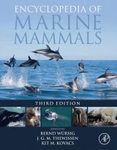![Ridgway and Harrison's Handbook of Marine Mammals, Volume 1 Ridgway and Harrison's Handbook of Marine Mammals, Volume 1]()
Click to have a closer look
About this book
Contents
Customer reviews
Biography
Related titles
About this book
Some of the world's most beautiful, intelligent, and highly adapted mammals inhabit our seas and oceans and have stirred the human imagination for many centuries. As our knowledge of marine mammals grows, the need exists for a reliable and complete reference to the ecology and biology of these fascinating creatures. To address this need, this series is a revamp of the original Handbook of Marine Mammals series that Academic Press published in six volumes between 1981 and 1998. Its name honours the original editors, Sam Ridgway and Richard Harrison. To stay abreast of new developments, this series features updated and definitive reviews of all the world's living whales, dolphins, porpoises, seals, sea lions, sea cows, and marine otters and bears. Seven volumes will cover all the living species of marine mammals.
This first volume in the series, Coastal Dolphins and Porpoises, consists of species review chapters written by leading global experts on more coastal, marine species of dolphins. Each chapter includes a description of the species, followed by sections on distribution and abundance, anatomy, physiology, behaviour, ecology, reproduction, parasites and diseases, and the impacts of human activities on the species.
Contents
1. Tucuxi (Sotalia fluviatilis)
2. Guiana dolphin (Sotalia guianensis)
3. Indo-Pacific and Australian humpback dolphins (Sousa chinensis and S. sahulensis)
4. Atlantic and Indian Ocean humpback dolphins (Sousa teuszii and S. plumbea)
5. Common bottlenose dolphin (Tursiops truncatus)
6. Indo-Pacific bottlenose dolphin (Tursiops aduncus)
7. Risso's dolphin (Grampus griseus)
8. Commerson's dolphin (Cephalorhynchus commersonii)
9. Chilean dolphin (Cephalorhynchus eutropia)
10. Heaviside's dolphin (Cephalorhynchus heavisidii)
11. Hector's dolphin (Cephalorhynchus hectori)
12. Harbor porpoise (Phocoena phocoena)
13. Vaquita (Phocoena sinus)
14. Spectacled porpoise (Phocoena dioptrica)
15. Burmeister's porpoise (Phocoena spinipinnis)
16. Finless porpoises (Neophocaena)
17. Dall's porpoise (Phocoenoides dalli)
Customer Reviews
Biography
Dr. Thomas Jefferson's main interests are the development of marine mammal identification aids and the systematics and population ecology of the more poorly known species of dolphins and porpoises. His work since receiving his PhD in 1983 has been related to conservation and management of marine mammals threatened by human activities. His current primary research focuses on the conservation biology of Indo-Pacific humpback dolphin (Sousa chinensis) and finless porpoise (Neophocaena phocaenoides) populations in Hong Kong and surrounding waters. He is also working on other projects looking at the systematics and ecology of these species throughout their ranges. In addition, he is involved in many other projects, including those on the conservation of the critically endangered vaquita (Phocoena sinus) and on the taxonomy and population ecology of common dolphins (Delphinus spp.).


































